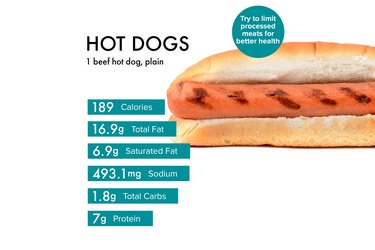
Hot dogs are one of America's favorite foods — in fact, in 2019, more than $6.2 billion was spent on hot dogs and sausages in grocery stores nationwide, per the National Hot Dog and Sausage Council.
From restaurants to street carts to backyards to ballparks, billions are eaten annually and the regional differences can be striking. Ask a New Yorker and they'll likely say they like a street dog with onions and yellow mustard while out west, you may find a foot-long with peppers, sauerkraut and onions.
Video of the Day
Video of the Day
Sausages as a form of processed food have been around for hundreds of years, but the birth of hot dogs has long been debated. Many believe that the North American hot dog is an extension of the frankfurter "wiener" that was created in Austria in 1487 and later brought over when Europeans came to America.
Hot dog historians believe that sausages became the norm at baseball parks starting in 1893 when the owner of the St. Louis Browns, a major league baseball team, started selling them at both the stadium and his bar, according to the National Hot Dog and Sausage Council.
Despite the debate around when the term "hot dog" became the norm, you'll still want to eat them in moderation.
Hot Dog Nutrition Facts
One hot dog is equal to a single serving. One beef hot dog, without a bun or condiments, contains:
- Calories: 189
- Total fat: 16.9 g
- Cholesterol: 34.8 mg
- Sodium: 493.1 mg
- Total carbs: 1.8 g
- Dietary fiber: 0 g
- Sugar: 0.7 g
- Added sugar: 0 g
- Protein: 7 g
Hot Dog Macros
- Total fat: One all-beef hot dog has 16.9 grams of total fat, which includes 0.7 grams polyunsaturated fat, 8.1 grams monounsaturated fat, 6.9 grams saturated fat and 0 grams trans fat.
- Carbohydrates: One all-beef hot dog has 1.8 grams of carbohydrates, which includes 0 grams of fiber and 0 grams of sugar.
- Protein: One all-beef hot dog has 7 grams of protein.
What About the Bun and Toppings?
Adding a white bun to your hot dog will contribute an extra 120 calories, 1.5 grams of fat, 200 milligrams of sodium, 23 grams of carbs and 4 grams of protein.
A tablespoon of ketchup will add 17 calories, 154 milligrams of sodium and 3.6 grams of sugar while a teaspoon of yellow mustard will add just 3 calories and 55 milligrams of sodium.
Vitamins, Minerals and Other Micronutrients
- Vitamin B12: 20% of your Daily Value (DV)
- Selenium: 11% DV
- Zinc: 11% DV
- Niacin (B3): 7% DV
- Riboflavin (B2): 7% DV
- Phosphorous: 6% DV
- Potassium: 4% DV
- Iron: 4% DV
- Vitamin B6: 4% DV
- Copper: 3% DV
- One hot dog is not a significant source of magnesium (1% DV), thiamin (1% DV) or calcium (1% DV).
Health Benefits of Hot Dogs
Hot dogs provide a variety of nutrients, but you'll want to limit processed meats in your diet.
1. Beef Helps Maintain Muscle
Beef is packed with essential nutrients that can help your body reach peak performance and preserve what you're building.
Clocking in at seven grams per serving, beef hot dogs provide a good amount of protein. Protein-rich foods are vital to building, maintaining and repairing muscle, which helps optimize muscle training response both during exercise and afterward in the recovery period, according to the National Institutes of Health (NIH).
Also integral to muscle metabolism is iron, which helps red blood cells deliver oxygen throughout the body, according to the NIH. Low levels of iron may lead to iron deficiency or iron deficiency anemia, with symptoms such as fatigue, weakness, gastrointestinal distress, immunity issues and impaired cognitive function.
There are two main forms of iron: non-heme, which comes from iron-fortified foods or plant-based foods, and heme, which is found in animal products such as beef.
One beef hot dog provides four percent of the DV for iron, helping you reach your daily dose.
Tip
Pairing beef with plant-based sources of iron like beans or lentils will help increase your absorption of non-heme iron.
2. It's Linked to Supporting Brain Health
Selenium is an essential nutrient, playing critical roles in hormone metabolism, reproduction, DNA synthesis and protection against infection and oxidative damage, according to the NIH.
Selenium deficiency has been linked to age-related declines in brain function, possibly stemming from selenium's antioxidant activity.
Studies have linked lower levels of selenium to a higher risk of cognitive decline over time.

Hot Dog Health Risks
1. Nitrates and Nitrites
Hot dogs are a form of processed or cured meat that may contain sodium nitrite or nitrate, which are compounds that keep food from spoiling. They've been linked to an increased risk of some forms of cancer.
Every 50 grams of processed meat consumed is linked to increasing the risk of colorectal cancer by about 20 percent, according to the American Institute for Cancer Research.
As with other processed foods, enjoying hot dogs in moderation is key.
2. Saturated Fat
Hot dogs are known to be high in saturated fat. One all-beef hot dog contains 6.9 grams of saturated fat, which is 34 percent of the recommended daily intake.
If you're opting for a beef hot dog, be sure to pair it with a plate full of vegetables and plant-based options to round out the meal.
3. Excess Sodium
Processed foods have a lot of sodium, and hot dogs are no exception.
One beef hot dog provides 493 milligrams of sodium or 21 percent of the recommended daily intake. Nationwide, sodium is often overconsumed, which may lead to hypertension and other cardiovascular diseases, according to the Centers for Disease Control and Prevention.
More than 70 percent of the sodium we take in can be linked to processed foods or restaurant meals, so keeping an eye on what you're eating is always helpful.
4. Food Allergies
There are a few ingredients in hot dogs which may cause an allergic reaction.
One is sodium nitrate, which is a chemical that is used frequently to preserve foods. Allergy symptoms include headaches, difficulty breathing, rash or gastrointestinal distress.
Another possible allergen may be annatto seeds, which are a natural food coloring that may be found in hot dogs. This has been associated with irritable bowel syndrome.
5. Drug Interactions
While hot dogs are not known to interact with any medication, be sure to discuss any food interactions with your medical professional.
Hot Dog Preparation and Useful Tips
Hot dogs are best stored in the refrigerator or freezer. Unopened, they can be safely stored for two weeks in the refrigerator unopened or up to two months in the freezer, per the USDA.
Once opened, they should be eaten within one week. Although hot dogs are fully cooked when purchased, they should be heated prior to eating. Hot dogs can be steamed, boiled, baked or grilled on a grill pan or outdoor grill.
Hot dogs can be used in a wide variety of ways. Here are some quick ideas.
- Grill and serve in a bun with toppings, such as mustard, ketchup, sautéed peppers, sauerkraut or pickles.
- Slice and add to macaroni and cheese.
- Wrap with dough and make pigs in a blanket.
- Slice and add to potato and vegetable hash.
- Slice and add to brown rice with peas and carrots.
- Make hot dog kebabs by slicing and threading hot dogs on skewers with vegetables and then grilling.
- Make chili cheese dog dip by combining sliced hot dogs with chili and cheese in a slow cooker.
Best Beef Hot Dog Brands to Buy
- Applegate Natural Uncured Beef Hot Dogs ($6.99, FreshDirect.com)
- Teton Waters Ranch Grass-Fed Beef Hot Dogs ($4.99, Target.com)
- Organic Prairie Hot Dogs ($9.99, Mercato.com)
Alternatives to Hot Dogs
Looking for an alternative to traditional hot dogs? There are chicken and turkey hot dogs or sausages available as well as vegetarian and vegan varieties.
Some of our favorite vegetarian and poultry varieties include:
- Field Roast vegetarian hot dogs
- MorningStar Farms veggie dogs
- Thin 'n Trim chicken hot dogs
- National Hot Dog and Sausage Council: “Consumption Stats”
- National Hot Dog and Sausage Council: “Hot Dog History”
- My Food Data: “Frankfurter or Hot Dog Beef”
- NIH: “Fact Sheet for Health Professionals: Vitamin B12”
- USDA: “Fact Sheet for Health Professionals: Selenium”
- USDA: "Hot Dogs and Food Safety"
- NIH: “Iron”
- NIH:” Dietary Supplements for Exercise and Athletic Performance”
- CDC: “Heart Disease: Sodium”
- USDA: "Hot Dog Buns White"
- USDA: "Ketchup"
- USDA: "Yellow Mustard"